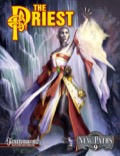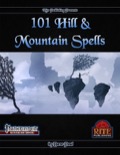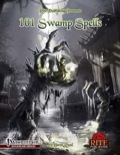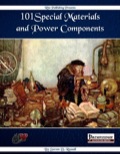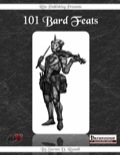Sign in to create or edit a product review. A lot of players find the cleric boring and it is a bit bland. Having had a chance to review the Priest, this is the class I want to play if I am not playing a cleric. Using a souped up version of the arcanist spell casting engine. I highly recommend this class to anyone who want to play a full caster instead of playing a cleric or warpriest. This is the latest installment of 101 spell from David J. Paul. As with all of the previous environmental 101 spells these are a very worthwhile addition to a game played primarily in the hills and mountains. There are a good mix of spells between the classes. Druids and Rangers get the most of the spells but nobody gets left out. This balance is extremely appreciated. There were no spells at questionable levels, a minor problem in 101 Swamp Spells. Favorites:
I highly recommend this for any campaign that allows 3rd party sources. This is an excellent addition for any Game Master or player where the campaign is primarily in a swamp environment. The PDF is 44 pages with 38 having content. Most of the spells have excellent flavor test even though mechanically they function as already existing spells. The Good:
The Bad:
The Ugly:
Conclusion and Recommendation:
Saint Bernard 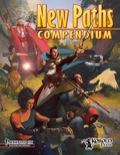
New Paths Compendium (PFRPG)Kobold PressAdd Print/PDF Bundle $32.99 Full Color Unavailable Add PDF $14.99 Impressive ProductThis is a 130 page compendium dedicated to introducing new options into the game. Instead of trying to review the entire document I am going to focus on the points I was most impressed with but nothing in this product is poorly thought out or written. CHAPTER 1 Classes: The star for me is the Thergue. Similar to wizard in spell casting ability, the thergue has the ability to cast both arcane and divine spells, more on that latter. Lever by level the thergue can prepare as many spells as the wizard but half of the spell slots are arcane and half divine. The thergue can know an unlimited amount of spells and stores them in two spell books, the one for the divine spells called a prayer book. As the thergue advances, the character gains two new arcane spells (sorcerer/wizard)and two new divine spells (cleric). As a special ability, the thergue can learn any other class's spells from a scroll or another spell book. Potentially a thergue can know every spell known. The thergue has the potential to be the most powerful character in game. CHAPTER 2: ARCHETYPES - A number of interesting and balanced archetypes are available for the player to explore. CHAPTER 3: FEATS & TRAITS - The winner here are the scalable feats. These fix the problem of feat chains. Instead of taking two weapon fighting followed by improved and greater two weapon fighting you take a single feat, which improves as the character advances. This is such a great advance I wish I could go back in time to the PF play test and suggest it. Highly recommended to use. CHAPTER 4: SPELLS - Some really good spells with nothing out of line. CHAPTER 5: MAGIC ITEMS & GEAR - The one item I would think about before I gave it out is the ever-full quiver. One of the downsides of an archer is ammo management. For 9,000 GP I can have an unlimited number of adamantine arrows. As a player I would love one. CHAPTER 6: TRACKING SHEETS - Some very useful addition sheets for players to track aspects of their characters. Overall, I highly recommend this product. As the title says this product contains 101 Special Materials and Power Components. Dealing with the easier of the two mechanics, power components first. These are a very safe addition to a campaign and an excellant way to get players involved in the more mundane aspects of being a spell caster. Power components are spell components, which give a type of spell, say conjuration (summoning), an edge. They are relatively inexpensive, usually in the 20-100 GP range and deliver a moderate boost in the power of the spell. The Champion's Gem costs 280 GP and the summoned creature appears at maximum hit points for its type. It also allows for touch based spells from the summoner to be delivered at range. Getting a maxed hit point summoned monster or natures ally is a definite increase in the effeciency of the spell but is mitigated by the cost of the component, which is used up in the casting of the spell. Being mostly one shot items, there is not the concern of releasing "death on a stick", a nickname in my campaign for a game unbalancing device. If a power component is too powerful, since they are one shot items, it is easy to limit access to them. Try taking Stormbringer from a character. Being a player of a low level magus, a Tarn shard would come in handy. The tarn shard costs 30 GP and holds 4 arcane pool points. Once the points are used, as a swift actions, the shard distengrates. Well within the price of a 1st or 2nd level character, it can significantly affect the ability of the party to be successful in dealing with their mission. Special materials need to evaluated a little more carefully. Most are interesting alloys used to make weapons and armor with. Some are fairly simple, like Mithron, which is a combination of cold iron and mithral and bypasses damage reduction like either. Others like Alchemy Ceramic and Chitonic Steel increase the critical confirmation roll by 2. Combined with critcal focus +4,certain traits +2, and you end up with a +8 to confirm the critical. Being relatively permanent items, these are a little harder to get rid of if the GM finds they are unbalancing for the particular game group. Overall, I would highly recommend this product. The power components add a lot of interesting material to a campaign and the potential for minor side quests. The special materials can function in a similar manner and a quest could be easily constructed around the search for a certain specific material. Of course, it does require the investment of both the GM and the players. I once played an elf paladin searching for the proper steel alloy to make a Damascus scimitar. Good gaming,
Disclamer: Other than ask for 101 Bard Feats I had no role in creating it. Bards have been my faviorite class since 2nd edition so I am biased about anything for the class. Review: If you are a fan of the bard class and not playing PFS, this is a must buy supplement. 101 Bard Feats adds obviously 101 feats to the class but more importantly adds a couple of great mechanics to acquiring some of these feats. For both the "vanilla" bard and the arcane duelist some of the feats can substitute for versatile performance and the bonus feats. I am only famialiar with the straight bard and arcane duelist and I am playing one of each currently so I concentrated on them. After picking three versatile performances before you get redundancies, being able to substute a feat is a great. The same is true for arcane duelist, while the normal bonus feats are good there are some of the available 101 Bard Feats which are great. A couple of standout feats need to be show cased. Acclerate performance is a great feat, which allows the bard to get better action economy earlier in their career. While some might disagree it is a strong feat for the buffing bard. Arcane duelist assimulation aloows an arcane duelist to transfer weapon enhancement into their weapon of choice. Quicken thirst is a must have for the arcane duelist, at the point you can get it the action economy aspect is not that important. The downfall of blade thirst is normally you can only use one bardic performance at a time. With quicken thirst, you can lead with blade thirst and the next round start another bardic performance. Solo accompaniment does the same thing but more generally. Bottom line: this product increases the abilities of the bard and is an addition to my gaming table. |




